|
|
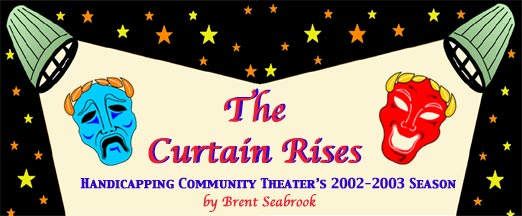
Handicap: Sports. To attempt to predict the winner of (a contest, esp. a horserace), as by comparing past performancs of the contestants.
In 1894, Frank Brunell began publishing his Daily Racing Form — a newspaper devoted to predicting the successes and failures of race horses, based on prior performance and recent developments. Now Bay Weekly adapts Brunell’s methods to give readers a peek into Chesapeake Country’s upcoming theater season.
Of course, race horses win or lose. Successes and failures for theatrical productions aren’t so easy to define. Attendance is one measure of success. Critical recognition is another. Third is winning awards.
The region’s most prestigious prize is the Ruby Griffith Award, bestowed each year by the British Embassy in Washington, D.C. Embassy adjudicators critique plays in Maryland, Virginia and the District for overall production excellence, then name the award’s recipient at a ceremony in July.
It’s impossible to say who will sell out shows or win the Ruby Griffith at this point in the season, but by glancing at the slate of plays, we can handicap each company’s chances.
Colonial Players Dare a Highwire Act
With 53 seasons behind them, Colonial Players are Chesapeake Country’s oldest theater company. A safety net of season-ticket buyers also allows the Players to be the most daring. They take chances, walking a highwire between artistic integrity and popular appeal.
“We seek to produce shows appealing to our audience members,” says Ken Sabel, a veteran and repeat president of the all-volunteer company, “as well as appealing to the designers, actors, technicians and directors who bring each show to life.”
|
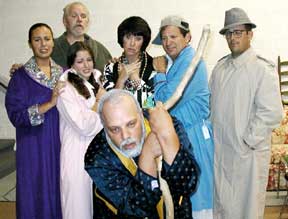
|
| God’s Favorites: Joe Del Balzo, front; Emily Dickens; Rhonda Torki; Brian Blanchard; Maud Gleason; Glenn Singer; Sean Brown. |
That balance is difficult to find, as demonstrated by the season’s first production, an uneven staging of Neil Simon’s God’s Favorite. The performances are good when the script is, and bad when it’s not. If that trend continues, the company could stumble over the challenges ahead.
The next production in their six-play season is Tom Stoppard’s Arcadia, opening October 18. Its director, Craig Mummey, grew careful about play selection as president of a Bowie Community Theatre, where risky ventures had driven audiences away. But this play is far from a safe choice. Stoppard’s strengths — wit, erudition, clever wordplay and intricate plotting — are also his weaknesses, and an inadequate staging of Arcadia can be dry and convoluted. Mummey should have his hands full.
The company’s annual production of A Christmas Carol begins December 5. Rick Wade and Dick Gessner’s adaptation of the classic story by Charles Dickens is a success long before its curtain rises: It sells out every year in a single day. This year that day is Saturday, November 16. Show up by break of dawn to stand in line for your ticket to this winner.
On January 10, the Players mount Barbara Lebow’s A Shayna Maidel, a great play for community theater. Instead of a famous playwright’s worst play, Maidel is a lesser known playwright’s best. It examines a familiar, emotionally charged situation — the Jewish Holocaust — with fresh insight and admirable restraint. Director Tom Newbrough’s seeming challenge is avoiding a hit.
March’s production is Pippin, Stephen Schwartz’s less successful follow-up to Godspell. Pippin is a schizoid musical — cute and sentimental one moment, dark and cynical the next. It’s easy to believe that Bob Fosse, author of the autobiographical All That Jazz, rewrote Roger Hirson’s book, though Hirson has always denied it. The company’s challenge, in this case, is to smooth over the wrinkles and blend the two sides into a complete whole. Director Barry Genderson sold the two sides of Malvolio, playing that character in Annapolis Summer Garden Theatre’s Twelfth Night. Can he now sell an entire production?
The Colonial Players’ season closes in April with Romantic Comedy, by Bernard Slade, the man responsible for Sally Field’s Flying Nun and The Partridge Family. Not surprisingly, then, Romantic Comedy is as formulaic as its title suggests. The film version, starring Dudley Moore as a philandering playwright, did little to disguise the script’s shortcomings. An architect by day, director Terrence Averill may likewise put too much faith in Slade’s blueprint.
The failure of God’s Favorite suggests Colonial Players might lower the wire by choosing less risky plays, but the company gets to continue to take chances so long as its safety net holds.
Twin Beach Players Suffer Growing Pains
As Chesapeake Country’s youngest company, Twin Beach Players are the current darlings of the theater family.
|
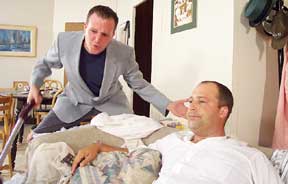
|
| Twin Beach Players Odd Couple: Luke Woods and Patrick Healey. |
“What a treat this was,” Bay Weekly distributor Vicki Marsh said, after seeing the company’s recent production of Neil Simon’s Odd Couple. Bay Weekly readers echoed her sentiment by voting the Twin Beach Players “best local theater company” in this year’s annual readers’ Best of the Bay poll.
The Players earned those accolades by attacking each production with vigor and sincerity. But the company also exhibits a youthful disorganization.
The Twin Beach Players began in 1997 with a mobile production of A Christmas Carol; a haywagon carried the audience from restaurant to restaurant between acts. When the audience grew too large for the wagon, the company tried performing the same play in one place. Last year they tried Little Women, instead, but neither production proved as popular as the first.
For Christmas this year, the Players bring in a new director from Washington, D.C., to stage three one-act plays, including adaptations of O. Henry’s The Gift of the Magi and Charles Tazewell’s best-selling The Littlest Angel. Most adaptations of Henry’s masterpiece, about an Edwardian couple who demonstrate the true spirit of Christmas, are little more than jarring transliterations that cram six or seven scenes into one act. President Sherry Hall says the company’s new director has a background in musical theater, so she may opt for Peter Ekstrom’s fluid musical rendition.
The company has yet to establish a venue for the production — the rustic Holland Point community center did duty for The Odd Couple — and they have yet to select their third play.
“We’re trying hard to develop a youth program,” Hall says, and finding a third play that suits kids as well as adults has proved a challenge.”
Bowie Community Theatre Eyes the Prize
It’s been 25 years since the Bowie Community Theatre debuted at Bowie Playhouse in Whitemarsh Park with an ancient Greek comedy, Aristophanes’ risqué Lysistrata. The company’s choice of plays has mellowed somewhat since, but the quality of its productions only increased, culminating in a Ruby Griffith Award after the 1997-’98 season.
The company now shares the beautiful Bowie Playhouse — once known as the Theater in the Woods — with 2nd Star Productions. Besides a stage, the two companies share casts, crews and publicity.
|
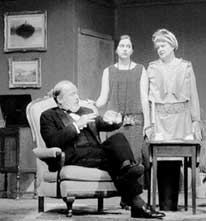
|
| Black Coffee performed by Bowie Community Theatre. |
Opening October 11 is P. J. Barry’s The Octette Bridge Club, a play so sentimental it might have made Oprah’s Book Club. It’s a look behind the Norman Rockwell facade of a Rhode Island family, circa 1934. But behind the facade, the characters are dull and the conflicts predictable. Director Charles Maloney delivered a palatable London Suite for 2nd Star, and he’s already assembled a capable cast, but he’ll be busy coaxing believable performances from his actors. There’s plenty of opportunity for the company’s always-able designers to strut their stuff on period props and costumes, however.
February’s production — You Know I Can’t Hear You When the Water’s Running, by Robert Anderson — is, like Neil Simon’s London Suite, a set of four short comedies, three centering on marital discord. Anderson’s lines are rarely as funny as Simon’s, but his situations are often more moving. To succeed, director Jack Degnan should play down the humor and play up the poignancy.
The Bowie season closes in May with Dial M for Murder. Written for the stage by Frederick Knott, this clever thriller is better known as grist for Alfred Hitchcock’s masterful mill. Hitchcock had a good eye for material, and Dial M is so good it would be compelling read aloud by kindergartners — even if you’ve already seen the movie. With such a strong script, director Mary Watko should have no trouble entertaining her audience.
Bowie Community Theater’s tradition of excellence looks to continue, but only Dial M offers material substantial enough to win another award.
2nd Star Shines
Only six years old, 2nd Star Productions is firmly established. Last season ended as well as it could. Co-founder John Guyton, recovered from a stroke, was back on stage in Guys and Dolls, a rip-roaring spring production that packed the house and garnered a Ruby Griffith Award for Outstanding Achievement in a Musical.
|
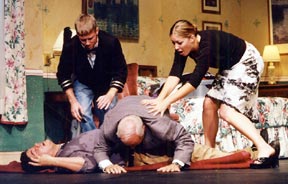
|
| 2nd Star’s London Suite cast: Cary Quintana on floor; Al Chopey on top; Shannon Webber and Anna Zablotney. |
That happy trend looks to continue this year. Performances of Neil Simon’s London Suite, now playing, aren’t selling out yet, but the quality of the production promises another solid season.
After Simon’s fairly daring situations, 2nd Star falls back on old standards, beginning in November with Meredith Wilson’s The Music Man. The show sports a familiar title and reunites three of the people responsible for the success of Guys and Dolls — actor turned director Jim Reiter, music director Donald Smith and choreographer Vicki Smith — so it looks like money in the bank.
Opening in March is John Patrick’s The Curious Savage, a comedy that depends, like Arsenic and Old Lace, on an old-fashioned morality for effect. The play can be as bright and charming as an antique shop — or as dark and musty. Besides being 2nd Star’s co-founder, director Jane Wingard directed Guys and Dolls, so bright and charming are distinct possibilities.
The 2nd Star season closes in June with Me and My Girl — a crisp, witty British musical from the 1930s that enjoyed an immense and deserved revival in the 1980s. A director hasn’t been selected yet, but the jokes are still funny and the tunes still catchy, so the horse at least runs. It’s up to 2nd Star to prove how fast.
Popular plays — staged in the beautiful building 2nd Star shares with Bowie Community Theater, on Wingard’s award-winning sets and directed by polished professionals — nearly guarantee another successful season, by any measure.
Pasadena Theatre Company Takes a Chance
Formed in 1978 to raise funds for area schools, the Pasadena Theatre Company has evolved into a seasoned crew. Previous seasons have produced plays as esoteric as Death Takes a Holiday, as substantial as Inherit the Wind and as demanding as Hamlet. Since 1997, however, the company’s stuck to a successful, if stodgy, formula. Every season includes a musical, a comedy (including two of Neil Simon’s hotel Suites) and an adaptation of It’s a Wonderful Life.
|
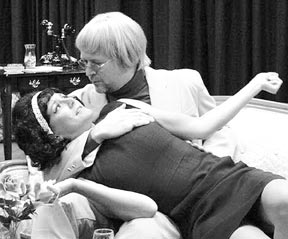
|
| Pasadena Theatre Company’s Robert Marshall and Nancy Dall in Plaza Suite. |
This season’s no different. It opens October 4 with The Adventures of the Honeymooners, a homegrown adaptation of the Jackie Gleason’s classic television vehicle. The success of The Honeymooners had more to do with the caliber of its stars than the quality of its material, but the premise adapted well enough to keep The Flintstones afloat for six seasons, so the Pasadena Theatre Company could wring three more weekends from it.
The season continues November 30 with another adaptation from screen to stage — the holiday classic It’s A Wonderful Life. Uncredited contributions by literary giants Dorothy Parker and Dalton Trumbo lend substance to the sentimental premise. The only real challenge in staging an adaptation is filling Jimmy Stewart’s sizable shoes.
Next is A Funny Thing Happened on the Way to the Forum — a musical comedy set in Imperial Rome. The show is the first for which Stephen Sondheim wrote both the music and the lyrics, but his work is easily outshined by Larry Gelbart’s book. Gelbart, who also wrote the screenplay for M*A*S*H, is a true craftsman; every line rings with double entendre. This is a surprisingly risqué choice for a company that prides itself on being family-friendly. It could alienate the company’s established audience, draw new attention or both.
The company has been itinerant since 1997, after a 13-year residence at Baldwin Hall in Millersville. The Honeymooners and It’s a Wonderful Life will both be staged at Anne Arundel Community College, but a venue for A Funny Thing Happened on the Way to the Forum has yet to be found. The company is still searching for directors for both of the latter shows, as well.
That’s Not All, Folks
The Moonlight Troupers, Anne Arundel Community College’s student production company, will send retiring department chair Bob Kaufmann off with a bang. He’ll direct the musical version of James Barrie’s classic, Peter Pan, in the Pascal Center theater he helped design and build. The play’s technical demands — exploding cannons, flying actors and a hungry crocodile — fit perfectly with Kaufmann’s background and expertise. If his sets and special effects don’t carry the audience over any flat performances from the student company, the show’s toe-tapping songs will.
Kaufmann’s retirement means there’s no handicapping Moonlight Troupers’ annual spring show.
Chesapeake Music Hall’s Tried and True Formula
The Chesapeake Music Hall provides a venue for struggling professionals, allowing them to earn a little money (by waiting tables) while sharpening their theatrical skills. As Chesapeake Country’s only for-profit theater company, the Chesapeake Music Hall sticks to tried-and-true musical favorites.
|
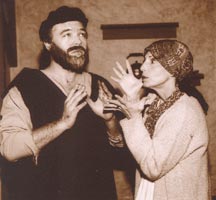
|
| H. Alan Hoffman as Tevye and Carol Cohen as Golde in Chesapeake Music Hall’s Fiddler on the Roof. |
On stage through November 23 is Fiddler on the Roof, a musical adaptation of Sholem Aleichem’s tales of life in a fictional Russian village. This is another play made famous by a filmed version, and again the biggest challenge in producing is filling the shoes of the celluloid star, Zero Mostel.
The musical version of A Christmas Carol opens November 30. With music and lyrics by Rodgers and Hammerstein and a story by Charles Dickens, this is a can’t-miss proposition. No wonder the Music Hall stages it every year.
January’s offering is a compilation of Broadway showtunes called Gotta Sing, Gotta Dance. After that it’s Meredith Wilson’s The Music Man, which plays through March and April. Maybe the Music Hall will recruit some talent from 2nd Star, which closes its production of the same play just in time for the Music Hall’s rehearsals.
The Music Hall’s season has no lull. Opening in May and playing through July is a musical adaptation of another Dickens’ classic — Oliver. Camelot sits between the August production of Chicago and the annual reprise of A Christmas Carol, which marks the end of one season and the beginning of the next.
Do or Die Mystery Theater
by April Falcon Doss“We Shoot to Kill, But We Aim to Please.”
— from the Do or Die answering machine
Murder Upon Request –— it’s a catchy title, don’t you think?
So did C.J. Crowe, when she picked that name for the interactive murder-mystery theater company she founded 15 ago. Unfortunately, it garnered some unwanted attention, too: The improvisational theater group got hauled in for audits twice in its first two years. In the wake of the audits, Crowe changed the company’s name to Do or Die.
|
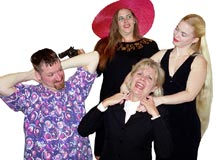
|
| CJ’s Gang: CJ, Starr Lucas, Karen Roebuck and Jose Delamar. |
That’s the nature of improv theater: You just never know what’s going to happen next, and flexibility is key.
Certainly Crowe wouldn’t have predicted murder mysteries as her path. As a young actress, she trained at the American Academy of the Dramatic Arts in California, studying classical acting and emphasizing Shakespeare. Back home in Maryland (she grew up in the D.C. suburbs), she was working at a gas station when she decided to try out for a job at the Renaissance Festival. None of her classical training prepared her for the work of improvisational theater.
“I was terrible,” she laughs. “The audition panel was 18 people, and I know I was awful.” Crowe got a bit of a break, though. A friend involved in producing the festival persuaded the audition committee that she was capable of more than she had shown.
“So they hired me on as a volunteer, as a trash scrounge,” she recalls. “And something happened. Something inside me just said, “This is it. This is my theater. This is what I’ve been waiting for. And for the next seven years, I had a blast.”
The road to writing, producing, directing and acting in those murder mysteries had not appeared on Crowe’s map until an innkeeping friend in Virginia needed “something unusual” to lure July 4 guests. Would Crowe round up some actor friends and put on an interactive murder mystery?
Crowe, 39, laughs easily and often, as you might expect from a woman who has made a business out of producing murder mysteries that consist of at least one part comedy.
Now, she’s laughing at that memory. “I wrote a script that was like 65 pages long” — she wasn’t leaving anything to chance — and corralled some of her fellow actors from the Renaissance Festival. The event was a huge success: the audience loved it. Crowe began seeking — and creating — opportunities to do more. As it turned out, she had a knack for the marketing and financial operations that go along with running a business.
“The other side of my nature,” she explains, “is that I really do enjoy accounting, management, business.” Do or Die Productions thrived.
She’s dedicated 15 years now to an art that’s unlike anything that goes on in traditional theater.
“We’ve all been taught that there should be this separation between audience and actor, that the audience sits passively and listens to what goes on on-stage,” Crowe explains. What she calls “fourth-wall theater” is that it breaks down the invisible wall between performer and audience.
In “interactive improv, the audience can mess with us and we can mess with them,” she says chuckling.
The audience begins with a program that describes the plot’s outline, and seats or places are set with clues. Some suggest questions they might want to ask the actors; others contain seemingly innocuous statements about a character’s past that might suggest a motive or cast suspicion. What the audience does with this information is up to them.
Each performance is unique, and each success depends on the audience’s willingness to let go of inhibitions, getting caught up in the spirit of things by pestering the actors with questions, firing accusations at them, even by drawing suspicion on themselves.
Most first-timers are a bit reticent, Crowe explains. But she also has a core of devoted fans who come back again and again — and at these shows, nearly anything can happen. The result is that the evening becomes a lively one in a way that more conventional theater often isn’t.
To Crowe, that’s all to the good. “With all the big-screen TVs, DVDs, video, cable, satellite, directTV, surroundsound that we all live in the middle of, theater really has to offer something different, something more than just passive entertainment,” she says.
Her words sound part invitation and part challenge. “You know,” she says, “I can describe this process every way from Sunday for you. But until you’ve seen it, it’s hard to really understand what it’s like.”
Opportunities abound to give it a try. Do or Die stages three or four dozen shows each year, at such convenient locations as Chesapeake Music Hall in Annapolis, Rod ’n’ Reel in Chesapeake Beach and Brooklyn Park’s Chesapeake Arts Center (where Crowe also serves as director of operations).
See for yourself in Halloween-themed dinner shows Oct. 25, 26 (8pm) and 27(3pm) @ The Studio Theatre at Chesapeake Arts Center, 194 Hammonds Lane, Brooklyn Park: 410/636-6597 • [email protected].
Also Oct. 31 at Chesapeake Music Hall, 339 Busch’s Frontage Road Annapolis: 410/626-7515.
Copyright 2002
Bay Weekly
|